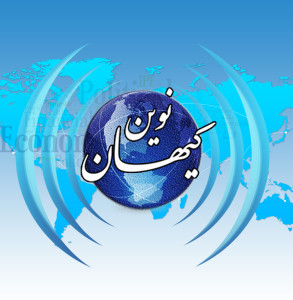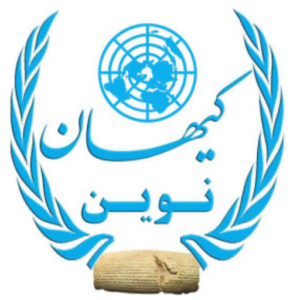ناتاشا فیلیپس (کیهان لایف) – نازنین افشین جم- مککی فعال حقوق بشر و یکی از بنیانگذاران کارزار «اعدام کودکان را متوقف کنید» به تازگی شبکهای از کنفرانسهای آنلاین برای گفت و شنید بین گروههای ایرانی مخالف جمهوری اسلامی راهاندازی کرده است.
Natasha Phillips (Kihan Life) – Nazanin Afshin Jam-McKay, a human rights activist and one of the founders of the “Stop the Execution of Children” campaign, has recently launched a network of online conferences for dialogue between Iranian groups opposed to the Islamic Republic.
کیهان نوین: نازنین افشین جم- مککی در گفتگو با کیهان لایف درباره چگونگی شکل گرفتن ایده برگزاری شبکهای از همایشهای آنلاین و چرایی راهاندازی آنها و نکاتی از نخستین وبینار که ۲۲ ژانویه برگزار شد توضیح داده است.
نازنین افشین جم: گروهی تأثیرگذار از متخصصان، فعالان، کارآفرینان، بشردوستان و چهرههای سیاسی در نخستین کنفرانس شرکت داشتند. من به ویژه میخواستم برخی از این گروههای جدیدتر که به تازگی تشکیل شدهاند، با یکدیگر گفتگو کنند.
«من در این گروهها و افرادی مانند شرکتکنندگان امید زیادی جهت تشكیل كنفرانسهایی با كارشناسان موضوعی میبینم كه به مسائل دشواری بپردازند كه میبایست مورد توجه سیاستمداران غرب قبل از رها كردن كامل رژیم و پذیرفتن یک گروه آلترناتیو موقت مثل شورای هماهنگی یا ائتلاف و یا دولت در تبعید قرار بگیرد.»
این شبکه تلاش میکند سازمانها و ایرانیان شاخص مدافع حقوق بشر و طرفدار دمکراسی را گرد آورد تا درباره فرصتهای همکاری گفتگو کنند.
اولین وبینار این شبکه روز ۲۲ ژانویه ۲۰۲۳ برگزار شد و ۲۵ شرکت کننده از سازمانهای مختلف مانند اتحادیه ملی برای دمکراسی در ایران (NUFDI)، انجمن جهانی ایران (GIA) شورای دمکراسی ایران (IDC) و شماری از جامعه ایرانیان مهاجر از جمله گلشیفته فراهانی بازیگر ایرانی- فرانسوی، حسن شریعتمداری فعال سیاسی و رضا مریدی نماینده پیشین پارلمان کانادا در آن شرکت داشتند.
ایران در کشاکش یک خیزش انقلابی علیه حکومت جمهوری اسلامی بسر میبرد. انقلابی که از ماه سپتامبر پس از قتل حکومتی مهسا امینی در بازداشت گشت ارشاد آغاز شد.
به گفته گروههای حقوق بشر، از آغاز اعتراضات، بیش از ۵۰۰ تن از جمله دستکم ۷۱ کودک توسط نیروهای امنیتی رژیم ایران کشته شدهاند. اتحادیه اروپا، بریتانیا و ایالات متحده در یک تلاش هماهنگ برای مهار سرکوب وحشیانه رژیم علیه معترضان، تحریمهای فزایندهای را در ارتباط با جمهوری اسلامی به اجرا درآوردهاند.
نازنین افشین جم- مککی در گفتگو با کیهان لایف درباره چگونگی شکل گرفتن ایده این همایشهای آنلاین و چرایی راهاندازی آنها و نکاتی از نخستین وبینار توضیح داده است.
چگونه به ایده برگزاری این کنفرانسهای آنلاین رسیدید؟
-زمانی که ما در حال تشکیل یک بانک اطلاعاتی جهانی از زندانیان سیاسی ایرانی بودیم و آنها را از طریق سازمان خود «جمعیت عدالت ایران» در اختیار سیاستمداران سراسر جهان میگذاشتیم، متوجه شدیم که چند نفر دیگر نیز پایگاه چنین دادههایی را راهاندازی کردهاند. یعنی هزاران ساعت به دلیل دوبارهکاری وقت تلف شده. اگر ما از قبل در مورد یکدیگر اطلاع میداشتیم، میتوانستیم تلاشهای خود را هماهنگ و ادغام کرده و کارآمدتر باشیم. در پروژههای دیگر نیز امیدوارم بتوانیم دوبارهکاری ها را کاهش دهیم و در عوض به جذب و ارائه کمک و داوطلبانِ حامی برای کسانی بپردازیم که به آن نیاز دارند.
به نظر شما نکات مهم نخستین کنفرانس چه بود؟
گروهی تأثیرگذار از متخصصان، فعالان، کارآفرینان، بشردوستان و چهرههای سیاسی در آن شرکت داشتند. من به ویژه میخواستم برخی از این گروههای جدیدتر که به تازگی تشکیل شدهاند، با یکدیگر گفتگو کنند. هر کدام از آنها در رشته خود به ارائهی دانش و اطلاعات پرداختند؛ به عنوان مثال، الیکا افتخاری از شورای دمکراسی ایران، کارشناس قوانین تحریم و اجرای تحریمهای مربوط به آمریکاست. علی رهنما وکیل دادگستری در مسیری که باید در تشکیل شورای انتقالی طی کرد، آگاهی زیادی دارد. ژیزل نعیمی«انجمن جهانی ایران» در مورد چارچوبی که برای تشکیل «مجمع شهروندان» لازم است صحبت کرد.
من در این گروهها و افرادی مانند شرکتکنندگان امید زیادی جهت تشکیل کنفرانسهایی با کارشناسان موضوعی میبینم که به مسائل دشواری بپردازند که میبایست مورد توجه سیاستمداران غرب قبل از رها کردن کامل رژیم و پذیرفتن یک گروه آلترناتیو موقت مثل شورای هماهنگی یا ائتلاف و یا دولت در تبعید قرار بگیرد.
من همچنین شنیدهام که گروهها برای فعالیت خود نیاز به بودجه دارند اما همه افراد حاضر در این کنفرانس داوطلب بوده و هر لحظه فراغت خود را وقف این هدف میکنند و البته اجرای چنین پروژههایی هزینههای طبیعی نیز دارد. شاید بتوان صندوقی برای کمک به آنها ایجاد کرد.
روند انتخاب سخنرانان در این کنفرانسهای آنلاین چگونه است؟
در این نشست فقط از گروههایی دعوت کردم که میدانم سخت تلاش کردهاند. به همه گفتم که این گردهمایی متعلق به «من» نیست، بلکه یک جمع است و اگر کسی از گروه دیگری که باید آنجا باشد، میشناسند، میتواند به این کنفرانس بپیوندد. تنها مشکل این است که افزودن هر گروهی به معنی زمان کمتر برای صحبت دیگران بود. لیلا منصوری وکیل دادگستری در آمریکا که در مجامع مختلف فعالیت میکند، چند گروه همراه خود داشت. این گروهها یک نظرسنجی درباره سازمانها و اطلاعات تماس که سوشیانت زنگنهپور از «اتحاد برای دمکراسی در ایران» (ADI) جمعآوری میکند، پر کردند و ما این جزئیات را توزیع بین گروهها خواهیم کرد تا بتوانند با یکدیگر در تماس باشند.
گام بعدی چیست؟
کنفرانس بعدی قرار است در ماه فوریه برگزار شود و تاریخی برای آن در نظر گرفته شده اما پیش از آن میخواهم از دیگران بازخورد بگیرم و ببینم برای کارآمدتر بودن آیا برگزاری گروههای کوچکتر با کسانی که روی موضوعات یا زمینههای مشابه کار میکنند مفیدتر خواهد بود یا نه
*منبع: کیهان لایف (کیهان نوین به زبان انگلیسی)
*ترجمه و تنظیم از کیهان نوین
In a conversation with Keihan Life, Nazanin Afshin Jam-McKay explained how the idea of holding a network of online conferences was formed and why they were launched, and some points from the first webinar that was held on January 22.
Nazanin Afshin Jam: An influential group of experts, activists, entrepreneurs, philanthropists and political figures participated in the first conference. I especially wanted some of these newer groups that have just formed to talk to each other.
“I see a lot of hope in these groups and people like the participants to organize conferences with subject experts who will deal with difficult issues that should be addressed by Western politicians before completely abandoning the regime and accepting a temporary alternative group such as the Coordination Council or the coalition or the government. be exiled.”
This network tries to bring together prominent Iranians and human rights defenders and pro-democracy organizations to discuss cooperation opportunities.
The first webinar of this network was held on January 22, 2023, and 25 participants from various organizations such as the National Union for Democracy in Iran (NUFDI), the Global Iran Association (GIA), the Iran Democracy Council (IDC) and a number of Iranian immigrant communities including Golshifteh Farahani French-Iranian actor, political activist Hassan Shariatmadari and former member of Canadian Parliament Reza Muridi participated in it.
Iran is experiencing a revolutionary uprising against the government of the Islamic Republic. The revolution that started in September after the murder of Mehsa Amini by the government in the custody of the Irshad patrol.
According to human rights groups, since the beginning of the protests, more than 500 people, including at least 71 children, have been killed by the security forces of the Iranian regime. The European Union, the United Kingdom and the United States have implemented increasing sanctions against the Islamic Republic in a concerted effort to curb the regime’s brutal crackdown on protesters.
In a conversation with Kayhan Life, Nazanin Afshin Jam-McKay explained how the idea of these online conferences was formed and why they were launched and some points from the first webinar.
How did you come up with the idea of holding these online conferences?
When we were forming a global database of Iranian political prisoners and making them available to politicians around the world through our organization “Iranian Justice Population”, we found out that several other people have also set up such a database. That means thousands of hours wasted due to rework. If we knew about each other in advance, we could coordinate and integrate our efforts and be more efficient. In other projects, I hope we can reduce the redundancies and instead focus on recruiting and providing support and volunteers for those who need it.
In your opinion, what were the important points of the first conference?
An influential group of experts, activists, entrepreneurs, philanthropists and political figures participated in it. I especially wanted some of these newer groups that have just formed to talk to each other. Each of them provided knowledge and information in their field; For example, Elika Eftekhari from the Iranian Democracy Council is an expert on sanctions laws and the implementation of sanctions related to America. Ali Rahnama, a lawyer, has a lot of knowledge about the path that should be followed in the formation of the transitional council. Giselle Naimi of Iran World Association talked about the framework that is necessary for the formation of the “Citizens’ Assembly”.
I see a lot of hope in these groups and people like the participants to organize conferences with subject matter experts that will deal with difficult issues that should be addressed by Western politicians before completely abandoning the regime and accepting a temporary alternative group such as the Coordination Council or the Coalition or the Government in Exile. to be placed
I have also heard that groups need funds for their activities, but all the people present at this conference are volunteers and dedicate every moment of their free time to this cause, and of course, the implementation of such projects has natural costs. Maybe a fund could be created to help them.
What is the process of selecting speakers in these online conferences?
In this meeting, I only invited groups that I know have worked hard. I told everyone that this gathering was not “me” but a gathering and if they knew anyone from another group who should be there, they could join the conference. The only problem is that adding any group meant less time for others to speak. Leila Mansouri, a lawyer in America, who works in various forums, had several groups with her. These groups filled out a survey about organizations and contact information that Susyant Zanganepour of the Alliance for Democracy in Iran (ADI) is collecting, and we will distribute these details to the groups so they can contact each other.
What is the next step?
The next conference is scheduled for February and a date has been set, but before that I would like to get feedback from others and see if it would be more useful to have smaller groups with those working on similar topics or areas to be more efficient. No.
*Source: Kehan Life (Kehan novin in English)
* Translation and arrangement from Kihan Navin













